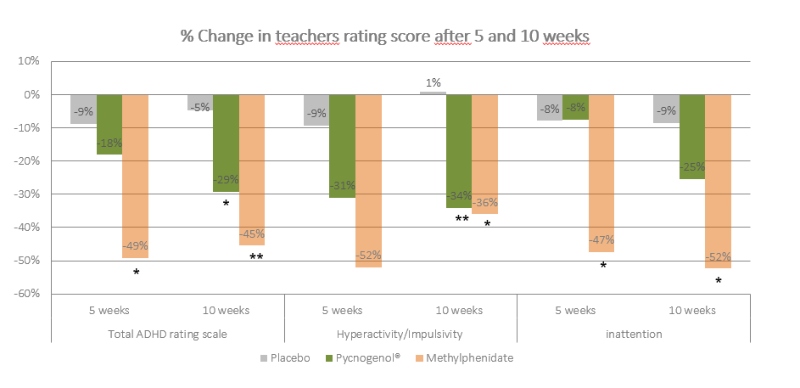New research has revealed taking super-antioxidant Pycnogenol French maritime pine bark extract can help reduce symptoms of ADHD by up to 34%, without the associated side effects of pharmaceutical treatment methylphenidate.
In the UK, it’s estimated that between 2% and 5% of school aged children have ADHD, and 3%-4% of adults – although the majority of these are undiagnosed.
Finally, the stigma surrounding Attention-Deficit Hyperactivity Disorder is reducing, with celebrities such as Dr Alex George, Love Island star Jacques O’Neill and presenter Richard Bacon recently bringing the condition into the spotlight by speaking out about their experiences of ADHD.
Characterised by developmentally inappropriate levels of hyperactivity, impulsivity, and inattention, ADHD is the most common paediatric neuro cognitive behavioural disorder.
The new research, published in the Journal of Functional Foods, tested 88 children from ages six to twelve for ten weeks. Participants were split into three groups: placebo, methylphenidate and Pycnogenol.
Teachers and parents filled out questionnaires at baseline and after five and ten weeks, including the ADHD Rating Scale (ADHD-RS), which assesses nine inattention and nine hyperactivity/impulsivity items. Some of the criteria assessed included difficulty following instructions, difficulty organising tasks and activities, fidgeting with hands or feet or squirming in seat and interrupting or intruding others.

After ten weeks, teachers reported the Pycnogenol group showed:
- 29% decrease in overall ADHD rating scale (vs. 45% decrease with methylphenidate vs. 5% decrease with placebo)
- 34% decrease in hyperactivity/impulsivity (vs. 36% decrease with methylphenidate vs. 1% increase with placebo)
- 25% decrease in inattention (vs. 52% decrease with methylphenidate vs. 9% decrease with placebo)
After ten weeks, parents reported the Pycnogenol group showed:
- 11% decrease in overall ADHD rating scale (vs. 28% decrease with methylphenidate vs. 1% increase with placebo)
- 12% decrease in hyperactivity/impulsivity (vs. 28% decrease with methylphenidate vs. 2% increase with placebo)
- 10% decrease in inattention (vs. 29% decrease with methylphenidate vs. 1% increase with placebo)
Children in the study who supplemented with the pharmaceutical showed improvement in ADHD behaviour but experienced up to five times more adverse effects than those who supplemented with Pycnogenol®. Specifically, loss of appetite and unwanted weight loss was observed with the pharmaceutical, but not with Pycnogenol.
“ADHD is a perplexing condition and treatment can be frustrating for many parents and children. Parents often feel reluctant to continue with prescription pharmaceuticals due to common side effects.” says author and renowned natural physician, Dr. Fred Pescatore. “Management of ADHD behaviour is pivotal to improved school performance and self-esteem, especially during a child’s formative years. This study suggests a promising natural path option.”
This new research comes after a 2006 study conducted in the Department of Child Psychiatry at the University Hospital in Bratislava found that Pycnogenol relieved hyperactivity and improved attention of children with ADHD compared to placebo. Another study, conducted in 2006, found Pycnogenol normalises total antioxidant status of ADHD children.
